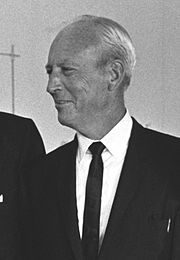John A. Burns
| John A. Burns | |
|---|---|
 |
|
| 2nd Governor of Hawaii | |
|
In office December 3, 1962 – December 2, 1974 |
|
| Lieutenant |
William S. Richardson Thomas Gill George Ariyoshi |
| Preceded by | William F. Quinn |
| Succeeded by | George Ariyoshi |
| Delegate to the U.S. House of Representatives from Hawaii Territory | |
|
In office January 3, 1957 – August 21, 1959 |
|
| Preceded by | Elizabeth P. Farrington |
| Succeeded by |
Daniel Inouye representative of new state of Hawaii |
| Personal details | |
| Born |
John Anthony Burns March 30, 1909 Fort Assinniboine, Montana, U.S. |
| Died | April 5, 1975 (aged 66) Honolulu, Hawaii, U.S. |
| Resting place |
National Cemetery of the Pacific Honolulu, Hawaii |
| Political party | Democratic |
| Spouse(s) | Beatrice Van Vleet (née) |
| Children | Jim John Sheenagh |
| Alma mater | University of Hawaii |
| Occupation | Detective |
| Profession | Police Officer |
| Religion | Roman Catholicism |
| Military service | |
| Nickname(s) | Jack |
| Allegiance |
|
| Service/branch |
|
| Years of service | 1927-1928 |
John Anthony Burns (March 30, 1909 – April 5, 1975) was an American politician. Burns was born in Montana, but became a resident of Hawaii in 1923. He served as the second Governor of Hawaii from 1962 to 1974.
John Burns was born in Fort Assinniboine, Montana on March 30, 1909. He was the eldest son of Anne and Harry Burns. Christened Harry John Burns, as a teenager he changed his name to John Anthony Burns. Burns’ father was in the Army and was ordered to Fort Shafter, so in 1913 he and his family moved to Hawaii, and eventually to Kalihi. Harry Burns became overwhelmed with responsibility for four children and left the family in 1919. Burns' mother became a launderer for Tripler Army Medical Center. Burns took care of his siblings and attended Saint Louis School, while his mother worked. She joined the Postal Service, and with the help of her brother, became postmaster for Fort Shafter and a clerk at the Honolulu Post office. In 1925 Anne sent John to live with her brother in Kansas, where Jack Scally served as a father figure. In Kansas he attended Immaculata High School in Leavenworth, then transferred to St. Benedict High School (now Maur Hill – Mount Academy) in Atchison. In 1927 Burns dropped out of high school and joined the Army, but did not like taking orders. He was honorably discharged after one year. Burns returned to Hawaii, waiting a semester to attend Saint Louis School and eventually graduate in 1930.
His work as a sympathetic police officer, building close ties with working class folks from numerous ethnic groups, notably Japanese and native Hawaiians. While a police officer in Honolulu, his first political efforts arose from his work with the Police Benevolent Society. From 1948 he led the Hawaii Democratic Revolution of 1954, through various leadership positions in the territorial Democratic Party, culminating in being chair of the territorial party in 1952. He is credited with building a coalition for the Democratic Party that included the Communist Party, 442nd Regimental Combat Team veterans, ILWU, other organized labor groups, and Japanese Americans to strengthen the party. In 1956, he was elected a party delegate from Hawaii. As a delegate, Burns played a key role in lobbying for Hawaii statehood, a goal that was achieved on March 12, 1959, when the statehood bill was signed by President Dwight D. Eisenhower. He sought to become the first governor of the newly formed state, but lost the election to Territorial Governor William F. Quinn.
...
Wikipedia
